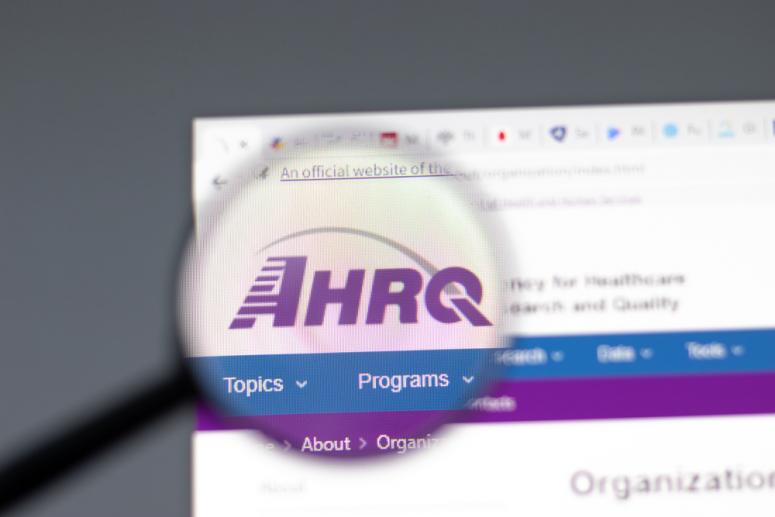
This year’s Annual Research Meeting (ARM) had a presentation on the “Future Directions and Opportunities for the Agency for Healthcare Research and Quality (AHRQ) in the Post-COVID-19 Era” from an all-star panel: Acting Director of AHRQ David Meyers, M.D.; Chairman of the National Advisory Council (NAC) at AHRQ Edmondo J. Robinson, M.D., M.B.A., M.S., and NAC Member Hoangmai Huu Pham, M.D., M.P.H. Registered attendees can watch the event here – and there is still time to register and watch all of the great presentations from the entire ARM.
Acting Director Meyers pointed out that the COVID-19 pandemic has created a window of opportunity, as inequities in health care delivery and outcomes due to structural racism have become unavoidably evident, significant gaps in public health data systems created supply constraints, and the primary care system has faltered. Despite these challenges, the pandemic has also shown that the time from research to implementation can be pared down at the same time new models of health care delivery have been developed. Beyond the pandemic, AHRQ has the opportunity to play to its strengths in supporting top Biden Administration health priorities, such as improving maternal health, addressing the opioid crisis, caring for unaccompanied children in HHS custody, and increasing health care value.
The Administration’s budget for FY22 includes a notable increase in AHRQ funding, increasing its discretionary budget by $42 million to $380 million. AcademyHealth believes this is a good first step, but has joined with over 120 health organizations in calling for AHRQ to be fully funded by Congress at $500 million in FY22. The Administration’s budget also proposes increasing health services research by making available $24 million in new investigator-initiated research grants, including broad HSR grants for R01 (Research Projects) and R18 (Research Demonstration and Dissemination Projects), grants to understand the effects of health systems innovations from the pandemic, and funding for delivering equitable health care. There would also be new funding for the Primary Care Initiative and the Opioid Initiatives, including funding for developing new models of primary care that increase access and health equity. Additionally, the budget proposal would increase investments in maternal health research with the creation of a 5-year initiative of linked projects that ensure policymakers have timely and accurate data and analytic resources about maternal morbidity and mortality.
This budget would better prepare AHRQ to research and support new health care delivery options. Dr. Robinson noted that the pandemic accelerated the transition to digital health care. Dr. Pham noted that the shift to telehealth was an example of a program that created higher-value care that also makes the health system more resilient and not as dependent on higher input costs. Pursuing high-value health care, eliminating inequities, and creating a resilient health care system are not independent goals, but are rather interconnected.
On the Administration’s budget proposal, Dr. Pham noted that she was impressed by the ambition of the policy priorities, especially on maternal health, substance abuse, and primary care research. Dr. Robinson pointed out that the budget was a vote of confidence in what AHRQ is capable of, and the Administration saying that more of it is needed. Dr. Pham agreed that the vote of confidence in this budget is huge because AHRQ has not always had that support from previous Administrations and was continually at risk of being overshadowed by sister agencies.
As a result of this extra funding, Dr. Robinson noted that health services researchers now need to apply for grants at AHRQ. The key to expanding AHRQ’s impact in the years to come is ensuring that they receive high-quality applications. Policymakers need to have access to timely and relevant research, and AHRQ would now have more capacity now to fund it. Dr. Pham argued that health services researchers should not just consider supporting the end users of research, but should partner with them throughout the research process to understand research gaps and system needs. Dr. Robinson agreed that end users should be a part of research design, but that research needs to be timely to be effective. Dr. Pham suggested that AHRQ could partner with health journals to create a pathway that supports this type of research.
The panelists further discussed how AHRQ could develop into a health care delivery innovation center in the post-COVID-19 world, similar to how the Center for Medicare and Medicaid Innovation Center works on the payment side of health care. They noted that AHRQ has the potential to lead the field of HSR rather than solely reacting to it.
All in attendance agreed that the pandemic has laid bare the deep racial and ethnic inequities within our health care system at the same time it has shown the limits of the system’s resiliency. The Administration’s budget is a clear recognition that AHRQ is the bridge between discovering cures and delivering care by providing evidence-driven, “last-mile” health outcomes. AHRQ and its stakeholders in the HSR community will determine how the Agency responds to this open window. To be a part of this advocacy opportunity, please send an email to Advocacy@AcademyHealth.org and join the Friends of AHRQ.